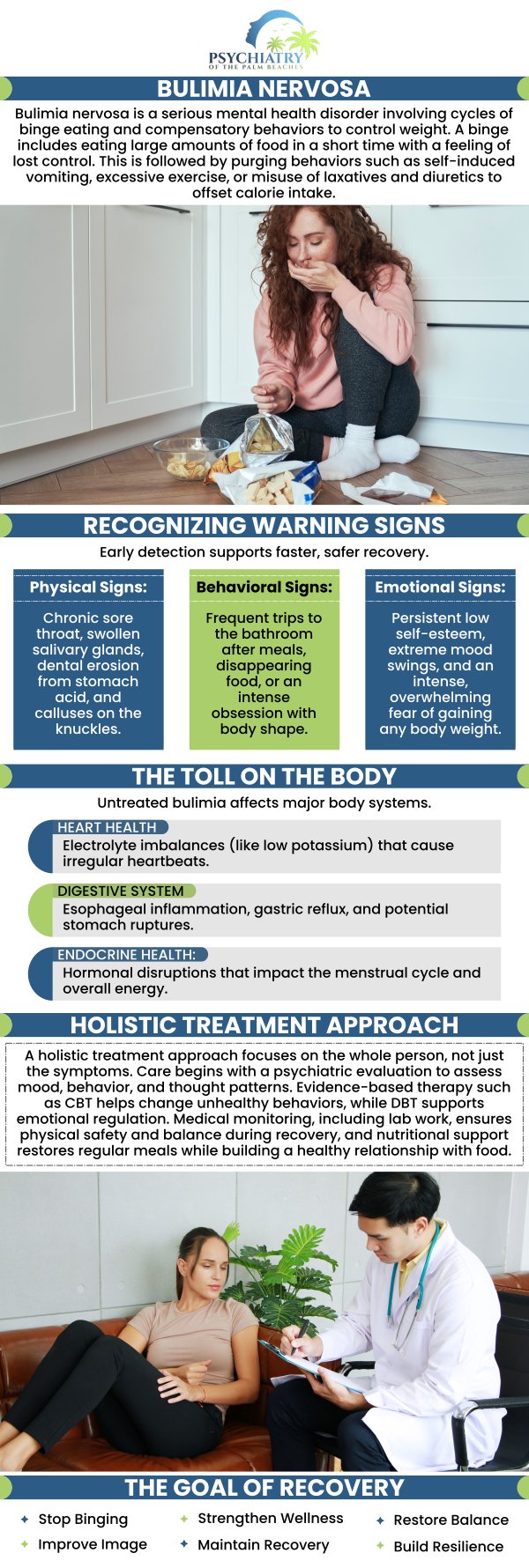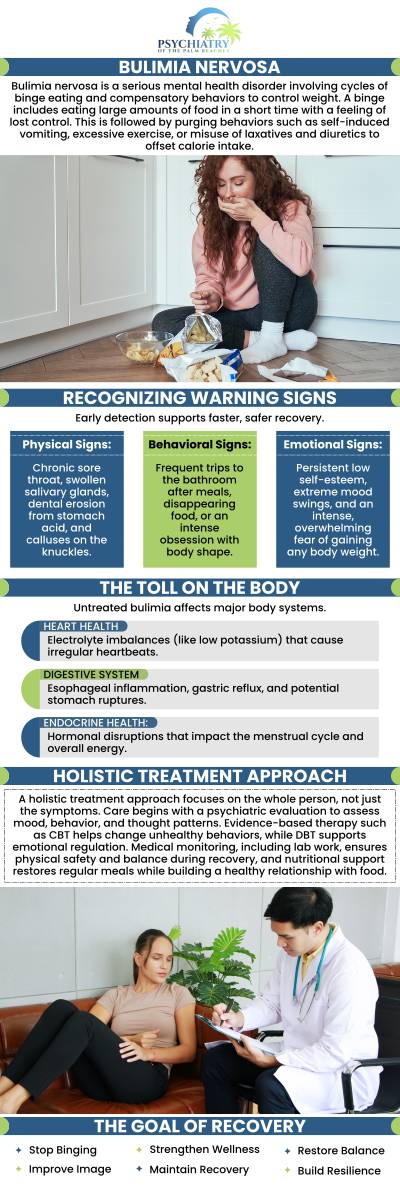Bulimia Nervosa Treatment Q&A
Dr. David Husted and the team at Psychiatry of the Palm Beaches offer specialized treatment for Bulimia Nervosa, a serious eating disorder characterized by cycles of binge eating followed by purging behaviors. If you or someone you know is struggling with Bulimia Nervosa, seeking professional help from experienced providers can be a crucial step toward recovery. For more information, contact us or book an appointment online. Visit Psychiatry of the Palm Beaches serving Jacksonville, Boynton Beach, Palm Beach Gardens, Stuart, Royal Palm Beach, Port St. Lucie, Melbourne, Fort Lauderdale, and Jupiter, FL.




Table of Contents:
What causes Bulimia Nervosa to develop?
How can I recognize the signs of Bulimia Nervosa in someone?
What are the psychological effects of Bulimia Nervosa?
How does Bulimia Nervosa affect physical health?
Our team at Psychiatry of the Palm Beaches is aware that bulimia nervosa is a complicated eating disorder with many facets that are defined by frequent episodes of purging behaviors after binge eating. Furthermore, we recognize that there is no single cause of bulimia nervosa; rather, a combination of genetic, environmental, psychological, and cultural factors is usually responsible.
One significant aspect of understanding bulimia nervosa is recognizing the role of biological factors, including genetic predispositions. As an experienced mental health practice, we are familiar with the latest research suggesting that individuals may be predisposed to the disorder due to their genetic makeup. Furthermore, we understand that neurochemical imbalances and hormonal changes may contribute to the onset of this disorder.
Our team of expert psychiatrists also factors in psychological influences when treating bulimia nervosa. We are aware that individuals with low self-esteem, a negative body image, perfectionism, impulsivity, and mood disorders like depression and anxiety are more susceptible. Our comprehensive approach to mental health enables us to treat these challenges while breaking the cycle of binge eating and purging that defines bulimia nervosa.
At Psychiatry of the Palm Beaches, we consider environmental and societal variables that can lead to the condition. We understand that stressful life events or transitions, societal and cultural pressures regarding body image, and family conflicts related to weight or eating can all trigger the onset of bulimia nervosa.
We are also aware of additional risk factors such as childhood trauma or abuse, a history of dieting, or restrictive eating, use of weight-loss supplements or medications, and substance abuse. We acknowledge that bulimia nervosa is more prevalent in industrialized countries, where food is readily available, and in professions or activities that emphasize thinness.
At Psychiatry of the Palm Beaches, we recognize the multifaceted nature of mental health, encompassing a spectrum of conditions such as bulimia nervosa. This severe eating disorder, characterized by cyclical episodes of excessive consumption followed by compensatory behaviors to mitigate weight gain, demands specialized clinical intervention. Recognizing the signs of bulimia nervosa is crucial for providing timely intervention and support.
Physical Signs:
Patients may exhibit weight fluctuations, often within the normal range for their age and weight, but with a fear of weight gain and a desire to lose weight. Other signs include damaged teeth and gums due to frequent vomiting, swollen salivary glands, dehydration, hormonal imbalances, and electrolyte imbalances.
Behavioral Signs:
Patients may show an unhealthy obsession with body shape, weight, and dieting. Bulimia nervosa may also manifest as frequent postprandial bathroom visits, secretive consumption, food hoarding, or extreme weight loss measures.
Psychological Signs:
Low self-esteem, intense dissatisfaction with their bodies, mood swings, depression, anxiety, difficulty concentrating, social withdrawal, and fear of eating in public are common psychological signs of bulimia nervosa.
Other Signs:
Sometimes, patients may use supplements or over-the-counter medications to suppress appetite or may have calluses on their hands or knuckles from self-induced vomiting.
At Psychiatry of the Palm Beaches, we urge you to remember that these signs may not be definitive but warrant further investigation. If you suspect a loved one has bulimia nervosa, approach them with compassion, sympathy, and nonjudgment. Encourage them to seek professional assistance. Our experienced team is prepared to manage such instances since early intervention is critical for avoiding serious health issues and facilitating recovery.
At Psychiatry of the Palm Beaches, we understand the psychological complexities of Bulimia Nervosa. Our team of skilled psychiatrists is dedicated to helping those suffering from this debilitating disorder and providing holistic care tailored to each patient’s unique needs.
We know that Bulimia Nervosa, often known as Bulimia, is a psychological condition that affects a person’s weight and physical health, as well as their mental well-being. This disorder can engender a distorted self-perception, obsessive preoccupation with weight, and profound self-esteem deficits, all of which we are equipped to address.
Bulimia is frequently connected with desperation and anxiety. Our team realizes the serious consequences of the recurring cycle of bingeing and purging, which can cause feelings of shame, humiliation, and a loss of control.
Experiencing irritability, mood swings, and cognitive distortions such as black-and-white thinking and self-destructive thoughts and behavior are other psychological effects of Bulimia. Our psychiatrists are experienced in handling these symptoms and offering therapies and treatments that help manage these mood disorders and cognitive distortions.
Individuals suffering from Bulimia may use substances such as alcohol or narcotics to cope. At Psychiatry of the Palm Beaches, we have professionals who can treat substance abuse disorders that may increase the psychological and physical impacts of Bulimia.
At Psychiatry of the Palm Beaches, we are aware that bulimia nervosa is more than just an eating disorder; it is a complex mental health condition with significant physical repercussions. Our professional staff of psychiatrists is well-equipped to offer help.
Gastrointestinal Complications: Our psychiatrists understand that bulimia nervosa can heavily impact the digestive system, leading to complications such as stomach distension, esophageal inflammation, and damage to the gastrointestinal tract.
Dental Problems: While our team does not directly treat dental issues, we recognize the oral health impact that bulimia nervosa can have and we can refer patients to dental professionals who can address these problems.
Cardiovascular Issues: We understand the strain bulimia nervosa can put on the cardiovascular system. Our psychiatrists can monitor for signs of dehydration, electrolyte imbalance, and irregular heartbeat, and coordinate with cardiologists to provide appropriate treatment.
Endocrine Dysregulation: At Psychiatry of the Palm Beaches, we recognize the hormonal imbalances that can result from bulimia nervosa and the impact they can have on women’s menstrual cycle and overall health. We can help manage these issues with medication and therapy.
Other Physical Consequences: The broad range of physical health effects caused by bulimia nervosa underscores the importance of our holistic approach to mental health care. We assess and monitor for other physical problems, such as skin, hair, and nail health, cold intolerance, fatigue, and potential organ damage.
Our Team’s Specialized Approach to Bulimia Nervosa Treatment
Bulimia nervosa requires a treatment plan that addresses the psychological, behavioral, and medical components of the disorder. Our team uses a targeted approach that includes structured therapy, nutritional support, and ongoing monitoring. At Psychiatry of the Palm Beaches, patients benefit from a treatment process designed to reduce harmful behaviors, improve self-esteem, and rebuild a healthy relationship with food.
Psychiatry of the Palm Beaches offers comprehensive care and support for individuals struggling with bulimia nervosa, emphasizing the importance of seeking professional help for managing its severe physical health impacts. For more information, contact us or book an appointment online. We have convenient locations to serve you. We serve patients from Boynton Beach FL, Delray Beach FL, Palm Beach Gardens FL, Jupiter FL, Stuart FL, Palm City FL, Royal Palm Beach FL, Wellington FL, Citrus Ridge FL, Jacksonville FL, Riverside FL, Port St. Lucie FL, Beau Rivage West FL, Melbourne FL, Palm Bay FL, Fort Lauderdale FL, Hollywood FL, Jupiter FL, North Palm Beach FL, and surrounding areas.
Check Out Our 5 Star Reviews



Additional Services You May Need
▸ Mental Wellness
▸ Relationship Coaching
▸ Depression and Mood Disorders
▸ Women’s Health
▸ Panic Disorder
▸ Medications Management
▸ Men’s Health
▸ Individual Psychotherapy
▸ Bipolar
▸ ADHD
▸ Geriatric Mental Health
▸ Couple’s Counseling
▸ Obsessive Compulsive Disorder
▸ Social Phobia Treatment
▸ Eating Disorders
▸ Post Traumatic Stress Disorder
▸ Psychotic Disorders


